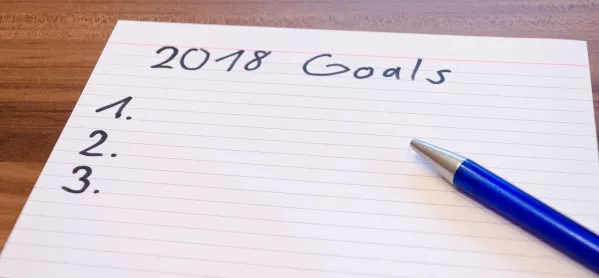Let’s make this new year truly a time of renewal, and of regeneration.
Hundreds of thousands of primary school children will return to school in the next week, or two. Most of them will be asked to think about what they would like to do better this year and to compose a new year’s resolution, many of which may even make it on to a display board - a clever, economical, way to fill a space that is required to be filled.
As the children beaver away, writing their aims for 2018, in their best handwriting no doubt, thousands of teachers will neglect the opportunity to write their own resolutions. Instead, they will be consulting the deluge of tasks on the “To Do List”, possibly even checking one or two off, as the children produce their work.
The word “resolution” implies making a firm decision on a course of action. It also refers to finding a solution to a problem. The word actually derives from the Latin, “solvere”, literally meaning to loosen, free or dissolve. This stimulates a nice image in my mind, of a problem dissolving in a glass of fizzing water: an opaque fog clearing.
I would like to propose that 2018 is the year in which we all take a firm decision to find solutions to the problem of stress-related illness in schools; the year in which we take significant steps in adding a little light into the murky glass in front of us. We have the creativity, within every school, to do this. Maybe we could begin with generating ideas from the children, because, ultimately, pressure and stress does filter down to them.
Ask the pupils
We could begin with a lesson, during which, working collaboratively, pairs of pupils propose five suggestions of how to relieve the pressure on them, a little. What could be done, from their perspective, to create less stressful classrooms?
Every voice would be heard. Pairs could join together and compile a shared version of the list (somewhere in the deep recesses of my brain, I am sure that there is a word for that - I think that it might be “snowballing”). We could collate the ideas, as a class, and even get our maths whizzes to rank them by points and generate a top five. As teachers, we could step back and allow the kids’ ideas to come to the fore.
We could have a staff meeting - hopefully including people at all levels of the organisation, because after all, we are all occupied in working towards the same goals and we are all affected by the pressure cooker that is the education system. Headteachers and senior leaders could step back and let the staff’s ideas come to the fore. Maybe they could even resolve not to be at the meeting because the truth is that discussions are always altered by the presence of senior leaders.
We could brainstorm (or, in modern parlance, “thought shower”) practical ways in which pressure could be alleviated. We could let each member of staff’s voice be heard. Once ideas have been generated and discussed in smaller groups, we could ask our assessment co-ordinator to work their magic and come up with a quantifiable interpretation and recommendations for action - now that would be a useful use of data.
The local authority could create a slot at the next headteachers’ meeting. “Improvement partners” could step back and allow headteachers to share the ideas of their staff, adding their own perspective, if necessary. Every headteacher’s voice could be heard. The borough’s data king or queen could collate the findings into a cheaply bound report (contrary to popular opinion, savings are always made in local authorities), which could be shared with the relevant schools and forwarded to the Department of Education.
Civil servants could read the reports and translate them into policy proposals, adding their own insights into how policy may best be transformed into practice. Who knows, the proposal might rise up through the hierarchy of the department, until finally, it may drift like a feather, into Nick Gibb’s or even Justine Greening’s briefcase.
Sitting on a sofa, towards the end of a long day, the minister might put her feet up and browse its contents and see what she thinks. She may even be moved to precipitate the spark of an action that ignites a real change.
David Jones is a pseudonym. He is a primary headteacher in the South West
Want to keep up with the latest education news and opinion? Follow Tes on Twitter and Instagram, and like Tes on Facebook




